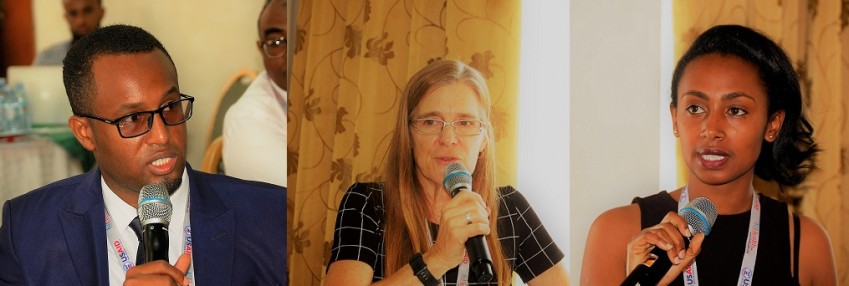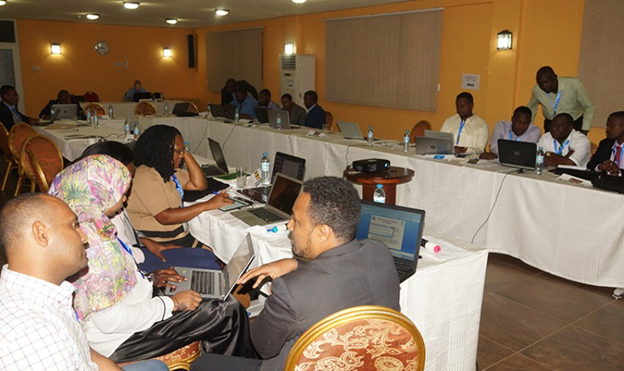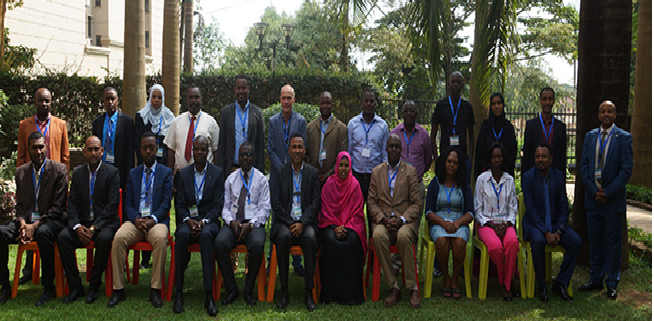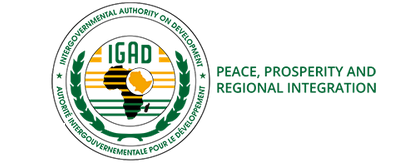
05 April 2019, KAMPALA (Uganda): The Intergovernmental Authority on Development (IGAD) this morning closed a Knowledge Management (KM) and community of practice workshop on health in Kampala in collaboration with the John Hopkins University’s Knowledge for Health Project (K4Health) that is funded by the US Agency for International Development (USAID).
The KM workshop reviewed and validated the IGAD KM Assessment Report, and also set the base for a KM for Health Strategy and the establishment of a Documentary Repository and Sharing System for health.
One of the main aims of this workshop was to address knowledge management gaps identified during the KM Needs and Gaps assessment that was conducted in August and September 2018. But also, this five-day workshop was an occasion to train the 35 participants drawn from IGAD member states and IGAD secretariat on basic principles, processes and tenets of Knowledge Management (KM).
Ms. HilinaDejeneDesalegne, Monitoring and Evaluation Expert at Policy, Plan, Monitoring and Evaluation Directorate-Federal Ministry of Health Ethiopia found the training sessions on how to use knowledge management for health very useful. “We were already using knowledge management in a somehow traditional way, but starting from now on I will use and apply the different steps and sessions I learnt here to my day-to-day activity to improve generation, collection, analysis, synthesis and sharing of health data from national level to the sub-national level”, she said.
“The uniqueness of this training is astounding to me because in a such short-period, it made me understand that “an effective KM for health” is the combination of using/learning from decades of published knowledge in KM field, the application of KM best practice tools and the utilization of technology for real time results in a systematic way”, according to Abdullahi Ismael, Head of Monitoring and Evaluation at the Ministry of health of Somalia
One of the trainers, Cheryl Lettenmaier – Kampala-based Regional Representative of The Johns Hopkins Center for Communication Programs, said her satisfaction to see very lively participants and did contribute a lot to the training, the review of the summary report on the IGAD Health Information and KM Needs, as well as to the initiation of the KM for health strategy.
In her closing remarks, Fatuma Adan on behalf of the Director of health and social Development Division, thanked Member States and IGAD Secretariat staff for their stewardship in putting together the draft vision, goals and objectives that will be incorporated onto the draft of a Regional Knowledge Management for Health Strategy. “Another key success was the establishment of a community of practice on knowledge management for health, a WhatsApp group and folders in the Google drive”, she said. She encouraged Member States to actively participate in the KM for Health WhatsApp group in order to finalize the KM for Health Strategy and the KM assessment report.
She also noted that member states and the IGAD secretariat were trained on the basics on knowledge management using a roadmap developed by Knowledge Management for Health project (www.kmtraining.org). The tools in this website are available for use by member states in establishing KM practices in their countries. Participants were encouraged to use the tools to establish systematic structures for KM for Health in their countries.
In conclusion, IGAD committed to continue with resource mobilization on behalf of member states in order institutionalize KM practices in every programmatic activity.

24-08-2018, Entebbe (Uganda): After five days of informative presentations, active participation and intensive group works, the Intergovernmental Authority on Development (IGAD) and the World Health Organisation (WHO) today closed the training on Dossier Assessment of Priority Medicines for the purpose of a harmonised medicines registration in the IGAD region.
This training was conducted within the framework of the IGAD Medicines Regulatory Harmonization (MRH) Initiative that is also supported by the World Bank.
Dr Fatuma Adan, Senior Regional program Coordinator at the IGAD Health and Social Development Division, appreciated the good quality of the presentations by the facilitators and the high level of engagement by the participating IGAD Member States’ Experts of National Medicines Regulatory Authorities (NMRAs).
As participants were given the opportunity to reflect on the training sessions overall,
Dr. Maper Dut Ador Weak, Pharmacist and Senior Inspector in Inspection & Surveillance at the
South Sudan Drug & Food Control Authority (DFCA), expressed the desire and need for a follow-up training in order to deepen the knowledge gained. That would be very much justified for and would help countries with very limited mechanisms of medicines registration to set up or strengthen registration facilities.
Dr Maper was joined by Dr. Yusuf Omar Mohamed, Chief Pharmacist and Head of NMRA-Somalia Ministry of Health and Human Services, who also pleaded for a community of practice among the participants that would allow information and knowledge sharing among member States and with the other stakeholders.
Dr Abraham Gebregiorgis, Geneva-based Technical Officer of the WHO, duly took note of the calls and expressed WHO willingness to support further capacity building within the resource limitations to the IGAD Medicines Regulations Harmonisation initiative.
IGAD AND WHO TRAIN FOR HARMONISATION OF MEDICINES REGISTRATION

20-08-2018, Entebbe (Uganda): The Intergovernmental Authority on Development (IGAD), with support from the World Health Organisation (WHO), this morning launched a five-day Hands-on Training and Dossier Assessment of Priority Medicines for IGAD Member States’ Experts of National Medicines Regulatory Authorities (NMRAs) in Entebbe.

This training, which is conducted within the framework of the IGAD Medicines Regulatory Harmonization (MRH) Initiative, is a capacity building exercise and dossier assessment of selected priority medicines in order to determine avenues for collaboration between IGAD Secretariat and member States NMRAs. It is also aimed at building capacity in the area of medicines registration and on how to review an application for marketing authorization for priority medicines.
More specifically, participants will be trained:
In her opening remarks, Dr Fatuma Adan - Senior Regional program Coordinator at the IGAD Health and Social Development Division, noted that it was “crucial for regional health systems and policies be harmonized and adopted by national governments in order to protect the region’s population”.
She recalled that “IGAD Regional MRH Initiative Proposal was endorsed by Member States in August 2017 and by the 10th Health Ministerial meeting in March 2018”. She tanked “WHO for their continued support in the region as Technical lead partner in global public health issues”.
Dr Abraham Gebregiorgis, Geneva-based Technical Officer of the WHO, underlined the critical aspect of the training in the implementation process of the IGAD Medicines Regulation & Harmonisation (MRH) programme. “On the one hand, it will build the technical capacity of the National Medicines Authorities, and on the other hand, it will be laying the foundation of the initiation of the IGAD MRH joint assessment activities”, he added.
Dr Abraham expressed his hope to see participants share gained skills and knowledge with respective colleagues at home and improve “efficiency and effectiveness in assessing dossier and also contribute in the regional joint activities”.
The mandate of National Medicines Regulatory Authorities (NRAs) is to protect the health of the public by allowing access to essential quality, safe and efficacious medicines. Dossier review and approval of essential medicines is a key factor to fulfillment of this mandate.
Despite this, most NMRAs are still faced with chronic shortage of human and technical resources, mainly due to budgetary constraints. There is need for member states to collaborate in dossier review so as to better utilize the scarce technical and financial resources available in an effort to improving systems for registration of medicines in the region.
IGAD Secretariat Avenue Georges Clemenceau P.O. Box 2653 Djibouti Republic of Djibouti
Call- +253-21354050
Mail- info@igad.int
The goal of Harmonization of Quality Management System (QMS) in Intergovernmental Authority on Development (IGAD) National Medicines Regulatory Authorities (NMRAs) is to have harmonized and functioning QMS within the NMRAs in accordance with national and internationally recognized standards.
Copyright © 2017 - All Rights Reserved -
